Recombinant Human C-C Motif Chemokine 3/CCL3
| Product name: | Recombinant Human C-C Motif Chemokine 3/CCL3 |
| Source: | E.coli |
| Purity: | Greater than 95% as determined by reducing SDS-PAGE. |
| Buffer Formulation: | Lyophilized from a 0.2 μm filtered solution of 20mM PB, 150mM NaCl, pH 7.4. |
| Applications: | Applications:SDS-PAGE; WB; ELISA; IP. |
| Storage: | Avoid repeated freeze/thaw cycles. Store at 2-8 oC for one month. Aliquot and store at -80 oC for 12 months. |
| UOM: | 100ug/50ug/200ug/1mg/1g |
| Source | E.coli |
| Description | Recombinant Human C-C Motif Chemokine 3 is produced by our E.coli expression system and the target gene encoding Ser24-Ala92 is expressed. |
| Names | C-C Motif Chemokine 3, G0/G1 Switch Regulatory Protein 19-1, Macrophage Inflammatory Protein 1-Alpha, MIP-1-Alpha, PAT 464.1, SIS-Beta, Small-Inducible Cytokine A3, Tonsillar Lymphocyte LD78 Alpha Protein, CCL3, G0S19-1, MIP1A, SCYA3 |
| Accession # | P10147 |
| Formulation | Lyophilized from a 0.2 μm filtered solution of 20mM PB, 150mM NaCl, pH 7.4. |
| Shipping |
The product is shipped at ambient temperature. |
| Reconstitution |
Always centrifuge tubes before opening. Do not mix by vortex or pipetting. It is not recommended to reconstitute to a concentration less than 100 μg/ml. Dissolve the lyophilized protein in ddH2O. Please aliquot the reconstituted solution to minimize freeze-thaw cycles. |
| Storage |
Lyophilized protein should be stored at < -20°C, though stable at room temperature for 3 weeks. Reconstituted protein solution can be stored at 4-7°C for 2-7 days. Aliquots of reconstituted samples are stable at < -20°C for 3 months. |
| Biological Activity |
ED50 is 3-10 ng/mL. |
| Purity |
Greater than 95% as determined by reducing SDS-PAGE. |
| Endotoxin | Less than 0.1 ng/µg (1 IEU/µg) as determined by LAL test. |
| Amino Acid Sequence |
SLAADTPTACCFSYTSRQIPQNFIADYFETSSQCSKPGVIFLTKRSRQVCADPSEEWVQKYVSDL ELSA
|
| Background | Human Chemokine (C-C Motif) Ligand 3 (CCL3) is a small cytokine belonging to the CC chemokine family. CCL3 is primarily expressed in T cells, B cells, and monocytes after antigen or mitogen stimulation. CCL3 exhibits chemoattractive and adhesive effects on lymphocytes. CCL3 exerts multiple effects on hematopoietic precursor cells and inhibits the proliferation of hematopoietic stem cells in vitro as well as in vivo. CCR1 and CCR5 have been identified as functional receptors for CCL3. |














